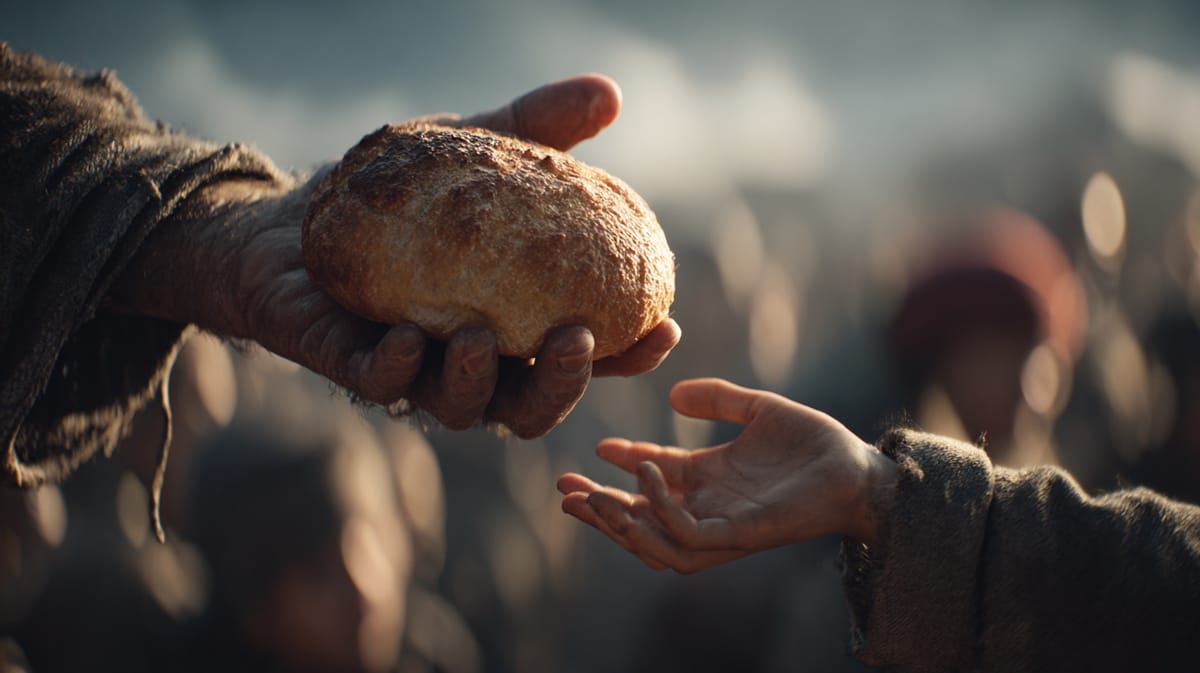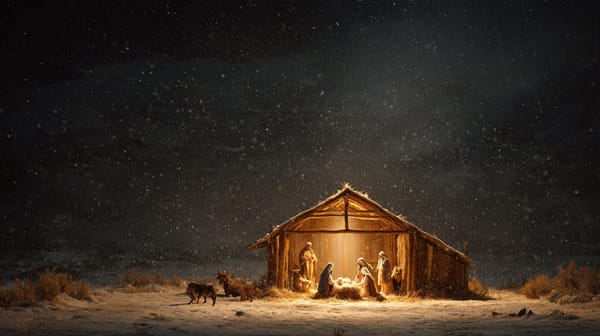Fairhaven Sermon 6-15-2025

Summary
In this week’s service, Rev. Peg Bowman addressed the congregation on Trinity Sunday, reflecting on the enormity of understanding the Holy Trinity while also sharing updates from the recent Western Pennsylvania Annual Conference. Conference highlights included the upcoming relocation to California University of PA next year, a resolution allowing for potential church reaffiliation after realignment, and discussions surrounding special Sundays focusing on various ministry needs. Rev. Bowman emphasized the importance of thoughtful and purposeful giving, encouraging the congregation to align their donations with specific needs and drawing inspiration from the United Methodist Committee on Relief (UMCOR) and Bishop Steiner Ball's challenge to find personal missions.
Continuing her reflections, Rev. Bowman highlighted UMCOR’s focus on critical global issues like forced migration, food security, education, health care, and peace and stability. She encouraged the congregation to consider how they can contribute to these efforts, either through direct support or local outreach. Connecting this to the Trinity, she explained how faith and reliance on God, through the Father, Son, and Holy Spirit, provides hope and endurance, especially in times of suffering, and ultimately inspires a spirit of compassion and action.
Transcript
Again, good morning and happy Father's Day to all our fathers, grandfathers, great-grandfathers, future fathers, and surrogate fathers. And as you know, today is also Trinity Sunday, a day in which we attempt to understand something that even the greatest minds of the human race have not been able to comprehend. It doesn't stop us trying, though. As David said in Psalm 8, When I look at the heavens, the work of your fingers, the moon and the stars that you have established, what are human beings that you are mindful of them, or mortals that you care for them, yet you have made us little lower than the heavens and crowned us with glory and honor.
And even just that much can be tough to get our minds around. But before I tackle the Trinity, I did want to fill you in on the goings on at annual conference this past weekend. It was wonderful to be back Bayside and Erie again. And as it turns out, sadly for the last time, next year's annual conference is going to move to a more central location, they said.
namely the campus of California University of PA, which might be a slightly less long drive. Some of you are going, No, I don't think so. Anyway, so that's gonna be next year. This is one of many ways in which the Western PA Conference is reorganizing of necessity after the realignment.
And I'll leave it to Pastor Dylan to talk about the financials. I did not hear anything remarkable along the financial lines, though, other than there's been a change in the company providing some of the retirement benefits, and that's basically, that's the biggest thing. There are a few other resolutions of interest, though. One resolution sets a policy for reaffiliation.
Now, after our realignment, Western PA Conference ended up losing about, roughly, numerically speaking, roughly half its members, pastors, churches, and districts. So the people attending this week were a bit puzzled, both lay and clergy, when a process for re-affiliation was proposed. And of course, the question immediately was, have any of the churches who have left asked to come back? And while no details could be provided at this point in time, it sounds like there have been some noises in that direction. So the resolution was passed to allow for this, following the general instructions in the Book of Discipline for organizing a new church.
And that would include having a minimum number of members and other requirements that the Book of Discipline has for new churches. And overall, I think that was a good decision. Also this week there were the usual nominations, recognitions of retirees, memorial service for clergy, and tucked away in all those details, that little resolution that allows me to serve your communion, yay. So I'm so pleased to finally be able to be a full pastor to all of you, it's just wonderful.
I'm still not officially Methodist yet, we're still working on that. But I think that's going to be a small step after this one. This is one last thing. And once that's signed off on, I'm officially official.
But still, in the meantime, the Lord's table. I can't wait to serve that for you. So praise God. The other big topic of discussion.
.. both formally and informally over meals, was the list of special Sundays, as they call them, that focus on the variety of ministry needs, things like Rural Life Sunday, Disability Awareness Sunday, Christian Education Sunday, so forth. These weekends usually have either special envelopes or special offering of some kind, And the list of these weekends is fairly long.
There are quite a few of them. The formal conversations during the plenary sessions centered around the need to focus on these weekends and not forget them. Because the needs are great. And the needs are great.
And the needs are great. Informally over meals, the conversations went more like this. These days, people are getting requests for money right and left. And it seems like every nonprofit I have ever spoken with in my life has been hounding me for money lately.
And not only that, but giving just once isn't good enough anymore. They want a donation a month. all the time. And this is a reflection of the times that we're living in.
And the problem is there's only so much any one person can give. And if people keep on being hounded for money like this, the result is going to be donor burnout and less giving rather than more. Now, I've talked with all of you about giving before we've had sermons on giving. And most of you know that I'm a strong believer in giving the way foundations give.
That is, I make use of my little own mission statements, okay? I don't believe in giving just because somebody has their hand out. I do, I mean, if my heart is moved and I say, okay, five bucks here, you are fine. But, I mean, in terms of..
. giving on a regular basis, I do a little bit of thought about that. I put some thinking behind it. And the question is, what needs, what do I want my money to accomplish, and what needs do I want to meet? So for my own personal mission statement, I may say, just as an example, I might say something like, I would like to give in such a way that no one in my neighborhood goes to bed hungry.
Okay. That would be my mission state, but that would be the goal. And in meeting that goal, I might talk to neighbors, I might donate to the Pittsburgh Food Bank, I might buy food to stock our food pantry out here. You get the idea.
Rather than just giving on impulse, I set goals and try to meet them. And what I like about this way of giving is first off, I can actually see the goals being met. And secondly, I can help more people with whatever money I can afford to give. Big bang, small bucks, right? So that leads me to the other thing that I wanted to share about this weekend at the conference.
I have mentioned to you all in the past how incredibly impressed I am with UMCOR. And for anyone from outside Methodism, that's United Methodist Committee on Relief or Commission on Relief. Committee on Relief, yes. Yes.
Bishop Steiner Ball basically said the same thing at conference this year, and I was so delighted to hear her say that. And she challenged each one of us to find your mission. Those are her exact words, find your mission. And that's kind of like that mission statement I was talking about.
So the bishop said, when we look at what Amcor is doing, find what touches your heart, and ask, how can I help provide hope and love and comfort in this situation? In other words, who are we in here? And what is God calling us to do? What has God created us to do? And this is what the bishop asked us, especially in relationship to Umcor. Now, two days before I left for Erie, Umcor sent out a flyer by email. Did you guys get this or no? Some did, some did, some didn't. Okay.
Okay. I like this little thing. I mean, most of the time it's like, yeah, donation stuff, you know, but not this one, okay? This announces five goals that the United Methodist Church has set for this year. And these goals were also mentioned at conference a number of times.
And from what I can tell from the research that I do for my own giving, UMCOR has absolutely nailed the greatest areas of need in our world right now. So along with our bishop, I invite you to look at these five areas of focus and choose one. Choose one that speaks to your heart. Choose one where you can identify ways of helping, either globally or locally, and not even necessarily with money.
Okay. It could be outreach. It could be neighborhood projects. It could be just about anything.
So the five areas of focus that were identified here are forced migration, food security, food security, education, health care, and peace and stability. And when they talk about peace and stability, what they mean is things like ministering in places like Gaza, the Democratic Republic of Congo, Ukraine, Sudan, places where battles are being fought right now. And one personal comment on that fifth item, that peace and stability. Most of us are at least somewhat familiar with what's happening in Gaza and Israel and Ukraine and Russia.
And this is why we pray for them every Sunday. Sudan's not as familiar, but I have a classmate who's currently serving in South Sudan. and he runs a Christian school there. Now, just a little bit of background.
Sudan and South Sudan are now two different countries as of 14 years ago. Sudan, the northern country, is currently in a civil war, which has then spilled over into a region known as Darfur. You guys have all heard of that because there was big trouble there a couple decades ago. And then South Sudan is down below and receiving a lot of refugees from these areas.
So... There is now peace between Sudan and Darfur, but there are refugees throughout the region living in poverty and illness, and that spills over into the categories of forced migration and food insecurity and health, which UMCOR has also identified.
See, these things are all tied together, so there's no just one separately. And so one of the reasons the United Methodist Church is stepping into these areas right now is because so many programs that used to be run by USAID have disappeared. And I think the UMC is really courageously trying to step up and make some of the difference there. Other projects that Amcor mentions in this brochure, in the Democratic Republic of Congo, the DRC, which is not as well known here in the States, the DRC has also seen civil war, violence, child labor, mass rapes, and sexual slavery.
And so for these reasons, I would like to add the DRC to our prayer list from now on. When I mention Ukraine and Russia, I'm going to mention the DRC as well. And then of course, I was very glad to hear UMCOR say on the very first page in here that we live in a time marked by the greatest forced migration crisis since World War II. Now, most of us here are not old enough to remember what Europe was like when Hitler was finally defeated.
We know how many people died under Hitler. Those numbers are well known. But do we know how many survived? It is estimated that about a quarter million people survived the camps and the ghettos at the end of the war. And all of these quarter million people had to try to find their way home.
They'd been carted off to foreign countries. They had no idea where they were, no idea where their relatives were, or even if their homes were still standing. And so it took people, some people, a decade or more to locate their families after Hitler was defeated. So when Umpcor talks about the greatest forced migration crisis as World War II, they're not Whistling Dixie.
I became aware of this issue back when, I'm sure many of you remember that terrible, terrible photo in the news of that little Syrian boy lying face down on the beach. That was in 2015. That was 10 years ago. That was the year the migration crisis surpassed World War II.
That was the year. It's been like this for 10 years now. Now. And for me, that photo has a personal turning point and ties in with my dad here.
My father, of blessed memory on this Father's Day, told me once that World War II was the defining moment of his generation. Now, he wasn't quite old enough to fight in it, but he remembers it. He remembers all the different things that they couldn't buy and the different things that they collected to support the troops. And he said, And something in my gut, when I saw that photo, something in my gut said that that little boy's death was the defining moment of my generation.
And so far, we haven't done as well as dad's generation did so far. We've been trying. We've been trying. But migration in some ways is a tougher battle to fight because it's estimated as of May of last year, when the numbers we're looking at is now about 120 million people who are homeless in the world because of violence or starvation or things outside their control.
And most of them, by the way, are not here. Most of them are over in Asia, Africa, Europe. But this issue is way too big to tackle. And so are all the issues in this brochure, if we try to take them on by ourselves.
But then I think, okay, well, World War II was way too big for Dad's generation to tackle, and they tackled it anyway. And so through programs like UMCOR, we can make real progress. As the brochure says on the cover, This moment matters. This moment.
So that's a lot to take in, and I thank you for your patience on that. I promised that I would say something about the Trinity today when we started off, this being Trinity Sunday. So let me put this aside now, and we'll take a brief look at the Trinity. There is a passage in the book of Romans that is one of the alternate scriptures for today in the lectionary.
And as I read this, I wanted to ask you to listen to for what the Father and the Son and the Holy Spirit are doing. So this is, and I forgot to jot down the actual verse there, but this is from the book of Romans. Paul writes, Therefore, since we are justified by faith, we have peace with God through our Lord Jesus Christ, through whom we have obtained access to this grace in which we stand, and we boast in our hope of sharing the glory of God, And not only that, but we also boast in our sufferings, knowing that suffering produces endurance, and endurance produces character, and character produces hope. And hope does not disappoint us, because God's love has been poured into our hearts through the Holy Spirit that has been given to us.
I think the main point of this passage, this writing of Paul's, is to explain how to keep on keeping on in tough times, which is a great message in itself, and I would love to preach that another day. Suffering produces endurance, and endurance produces character, and character produces hope. Great stuff. But this is only true because God is present, and not just any God.
Our three-in-one trinity, God. Listen to Paul again. We have peace with God, there's the Father, through our Lord Jesus Christ, that's the Son, because God's love has been poured into our hearts through the Holy Spirit, that's the Spirit, there's your trinity. I think sometimes maybe the Trinity is better understood by the experience of living our faith rather than just mulling over the concept of God in our minds, which makes sense because we get to know someone by spending time with them, not by just thinking about them.
So Paul writes in the context of faith and the fact that we are saved by faith, not by anything that we do. We can't earn salvation. We are not saved by how often we come to church, although we should still come to church. We are not saved by how much we give, although we should still give.
We are saved by faith. by trusting God, by believing God's words. We know God is faithful. We know God doesn't lie.
We know God never plays games with us. God never says one thing and means another. God is the word. Jesus is the Word made flesh, and the Holy Spirit brings that Word to us, making God's Word known to us from the inside, and that's the working of the Trinity in our lives.
So, on this Father's Day, our relationship with our Heavenly Father is a relationship of faith and love. For those who'll be seeing your dads later today, have a wonderful day. For those of you like myself who are missing our dads today, we give thanks to God for the men who raised us, taught us, fed us, clothed us, encouraged us, gave us dreams to aim for. By the grace of our Father God, we look forward to seeing our dads again one day in the kingdom of heaven.
Thanks be to God. Amen.



